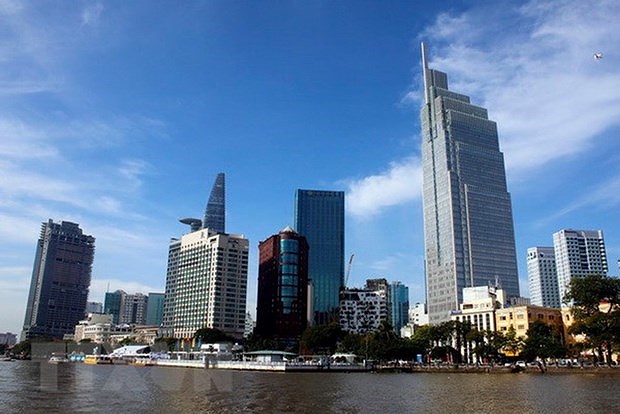 A corner of Ho Chi Minh City - the southern hub of Vietnam (Photo: VNA)
A corner of Ho Chi Minh City - the southern hub of Vietnam (Photo: VNA) If breakthroughs in institutional reforms are achieved
to improve growth quality, coupling with timely and sound fiscal and monetary
policies, the Vietnamese economy could expand 6.76 percent a year during
2021-2023, according to Director of the Central Institute for Economic
Management (CIEM) Tran Thi Hong Minh.
Minh presented the forecast while speaking at the workshop “Making Economic
Recovery and Institutional Reforms Intertwined After COVID-19 – Way Forward for
Vietnam” recently held by CIEM with the support from Aus4Reform and the
Australian Embassy to Vietnam.
According to the scholar, thanks to good control of the COVID-19 pandemic,
Vietnam has seen good recovery in its socio-economic activities.
Right in the time of the pandemic, the Southeast Asian country witnessed great
strides in international integration such as ratification and implementation of
the EU – Vietnam Free Trade Agreement (EVFTA), EU – Vietnam Investment
Protection Agreement (EVIPA), UK – Vietnam Free Trade Agreement (EVFTA), and
the Regional Comprehensive Economic Partnership (RCEP).
Although Vietnam is one of the very few countries successfully containing
COVID-19, creating a basis to recover and promote domestic production, as well
as reopen the economy safely, Vietnam needs to adopt a long-term plan for post-pandemic
economic recovery, Minh added.
CIEM has outlined three scenarios for economic growth, based on Vietnam's
management of the pandemic this year. Under the first scenario, CIEM forecasts
that the Vietnamese economy will grow at an average 6.35 percent a year in the
next three years.
Under the second scenario, with fiscal and monetary policy easing, the average
growth could reach 6.7 percent.
Under the third scenario, with fiscal and monetary easing along with
institutional reform, the economy could expand 6.76 percent.
Regarding the reform process for Vietnam, Nguyen Anh Duong from CIEM said that it
should continue its COVID-19 prevention
work and its efforts to remove bottlenecks facing the business community and
workers and promote economic institutional reform this year.
In 2022, it is necessary for the country to carry out economic recovery
measures in tandem with economic institutional reform. Meanwhile, solutions to
support economic recovery should be withdrawn, and focus should be sharpened on
economic institutional reform, Duong added.
Vietnam can achieve better economic growth if it loosens monetary and fiscal
policies, but it could suffer from higher inflationary pressure, he pointed
out.
Loose monetary and fiscal policies could result in higher economic growth and
improvements in productivity if combined with institutional reform, he added./.